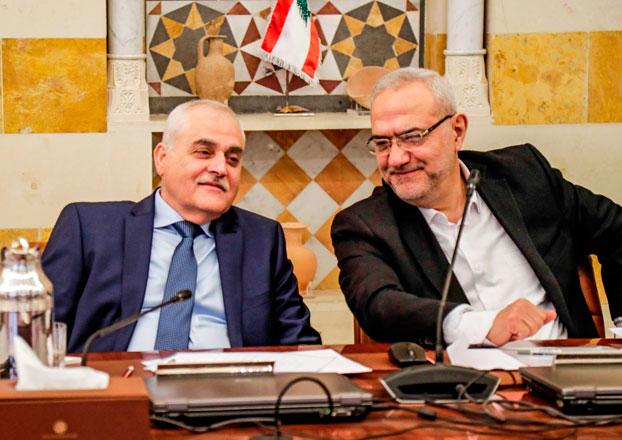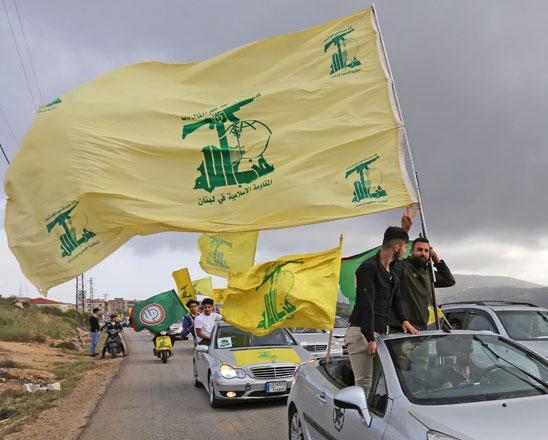You are here
Building on Syria war gains, Hizbollah scores political win
By Reuters - Feb 02,2019 - Last updated at Feb 02,2019

Jamil Jabak, Lebanon's new Health Minister (left) and new Minister of State for Parliamentary Affairs Mahmoud Qmati attend the first Cabinet meeting at the presidential palace in Baabda, east of the capital Beirut, on Saturday (AFP photo)
BEIRUT — Hizbollah's bigger role in Lebanon's new unity government points to a growing appetite to shape state affairs and builds on unprecedented military clout the group is wielding after helping turn the tide in Syria's war.
Hizbollah's expanding power in Lebanon reflects a deepening of Iranian influence in an arc of territory from Tehran through Baghdad and Damascus that its foes Saudi Arabia and Israel have struggled to counter.
Deemed a terrorist organisation by the United States, Iran-backed Hizbollah has assumed control of three ministries in the government led by the Western-backed Prime Minister Saad Al Hariri, the largest number of portfolios it has ever held.
The new government was formed on Thursday, ending nine months of wrangling.
The most significant portfolio under Hizbollah control is the Health Ministry, the first time Hizbollah has controlled a ministry with a big budget, though the Shiite doctor it picked for the job is not a party member.
More broadly, Hizbollah and its political allies from across Lebanon's sectarian spectrum have emerged with more than half of cabinet's 30 seats, reflecting a May parliamentary election which the group declared a victory.
Salem Zahran, an analyst with links to Hizbollah leaders, said the government would go down in its history as the "first big shift and the first step along a long road" towards more influence in government.
"This transformation is because Hizbollah has accumulated an excess of power after it has nearly finished with the military battles in Syria," he said. "I believe that Hizbollah will build up even more involvement in the Lebanese state".
Hizbollah, founded by Iran's Revolutionary Guards in 1982, is by far the most powerful group in Lebanon. Its clout in the region has grown since it joined the war in Syria in support of President Bashar Assad.
Lebanese government posts are parcelled out according to a complicated sectarian system, capping how many any one group can hold. The post of prime minister is reserved for a Sunni Muslim, a job Hariri has now held three times because of his status as Lebanon’s leading Sunni.
But Hariri’s Sunni dominance was shaken by the May election in which he lost more than one third of his seats in parliament, many of them to Hizbollah-allied Sunnis. Hizbollah managed to secure a Cabinet seat for one of its Sunni allies.
This is a big gain for Hizbollah and its allies who have long sought to erode the Sunni dominance built by the Hariri family after Lebanon’s civil war, with the backing of Riyadh.
As Hizbollah’s clout has grown, Saudi Arabia has turned its focus away from Lebanon to other parts of the region, weakening Hizbollah’s opponents who had benefited from its backing.
Hariri’s ally, the staunchly anti-Hizbollah Christian Lebanese Forces (LF) Party, was forced to cede significant ground during nine months of political wrangling over government portfolios, though it gained seats in parliament.
Hizbollah’s biggest Christian ally, President Michel Aoun and his Free Patriotic Movement, made fewer concessions.
The most significant was giving the ground needed for Hizbollah’s Sunni ally to join the cabinet — a point of friction between the allies. But Aoun, who backs Hizbollah’s possession of weapons, still controls one third of the Cabinet.
‘Strategic imbalance’
Nabil Boumonsef, a Hizbollah critic and An-Nahar newspaper columnist, said Hizbollah’s role was “growing very clearly” and noted that Hariri allies failed to secure all their demands.
“This strategic imbalance confirms that Hizbollah’s influence in this government is stronger than in the previous one for sure. This absolutely cannot be denied,” he said.
This poses questions for the United States, whose Lebanon policy twins military aid to the Lebanese army and support for Hariri with growing pressure on Hizbollah through sanctions.
The US State Department said in a statement it was concerned that Hizbollah would continue to occupy ministerial positions and was allowed to name the health minister.
“We call on the new government to ensure the resources and services of these ministries not to provide support to Hizbollah ... We look to all parties in the new government to uphold Lebanon’s policy of disassociation from regional conflicts and its international obligations,” it said.
The United States has imposed new sanctions on Hizbollah as part of its strategy to counter Iran.
The frontpage headline of the pro-Hizbollah newspaper Al Akhbar said Hizbollah needed “a government amid the storm”.
“Hizbollah benefits today from the government led by Hariri specifically ... because Hariri, with his Western and Gulf [Arab] facade could be a safety net or helper, keeping options open, when it comes to escalating American sanctions,” Al Akhbar wrote in its main story on the government.
A senior Western diplomat said Hizbollah’s opponents would keep a close eye on how Hizbollah manages the Health Ministry.
“The other parties will closely monitor the funds Hizbollah has in the ministry and will cry foul when something is happening, because they know the Americans are looking in the same direction.”
The new health minister, Jamil Jabak, has said his priorities include improving government hospitals and bringing down drug prices.
Related Articles
BEIRUT, Lebanon — Hizbollah and its political allies won just over half the seats in Lebanon’s parliamentary election, unofficial results sh
BEIRUT — The Lebanese Shiit Muslim group Hizbollah will not give way in a dispute over Sunni Muslim representation in a new unity government
BEIRUT, Lebanon — Saad Al Hariri will be Lebanon’s prime minister for a third time, after winning the backing of a majority of MPs in offici

















